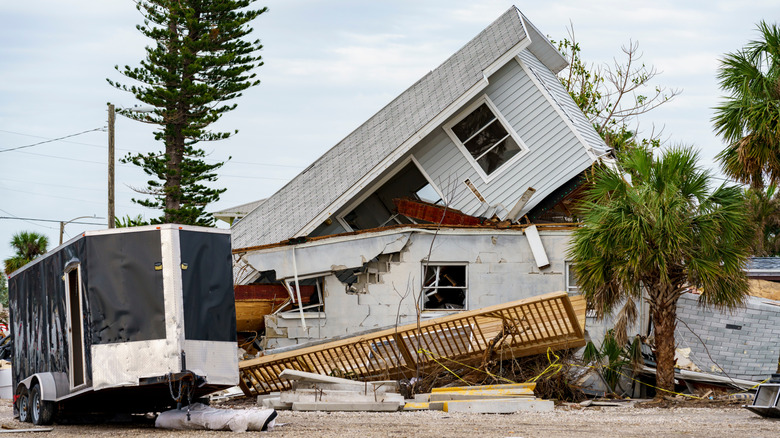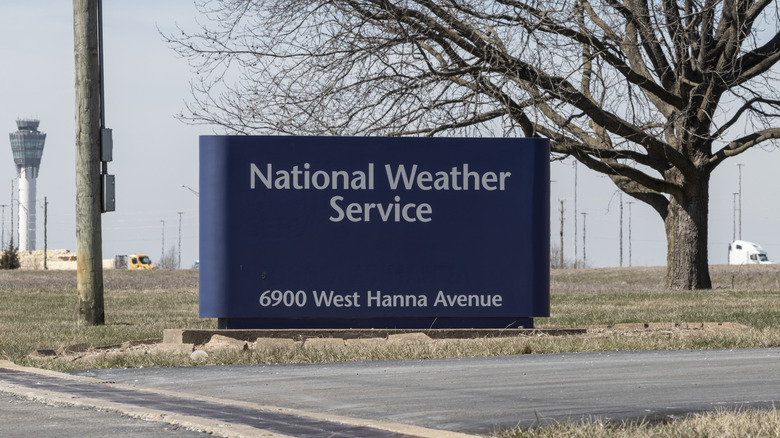The Upsetting Detail About Florida's 2025 Hurricane Season To Know Before You Vacation There
Florida, a mainly coastal destination north of the tropics, is one of the five main destinations in America most likely to be hit by hurricanes. From June until November, the Sunshine State isn't always sunny — in actuality, this is the time when hurricanes typically hit the area, according to Visit Florida. It is imperative for meteorologists on a local and national level to track these storms and help the public with the most up-to-date information on how to stay safe for residents, as well as those preparing for travel during hurricane season. Although this is an essential worker's duty, it is becoming increasingly worrisome to those in the industry due to the Trump Administration's federal worker layoffs, which are in line with the "Project 2025" initiative (via PBS).
The National Oceanic and Atmospheric Administration (NOAA) — the experts who track hurricanes — were part of the mass job losses. At least 880 employees' names were on the list at the end of February 2025, and an additional 1,000 professionals' jobs have been looming since, according to Space. Some of these layoff positions included two flight directors, who help the NOAA hurricane hunters aircraft operating in the air 24/7, giving the most accurate on-the-scene information reported. These positions are some of the most important and, with limited crew members, will now face direct challenges in keeping citizens safe.
The problems meteorologists face with NOAA layoffs
From the eye of the storm to first-responder efforts, as well as revealing destinations that can be revisited after natural disaster damages, the NOAA helps assist local meteorologists with the most accurate weather models, satellite data, and radar information to provide their audience. As an already understaffed federal program, with Project 2025 proposals at play, the organization faces even harsher challenges that cast a wider net. The NOAA was hoping to hire two more flight directors to have a staff of 10. This recruitment would have been important in a situation where one director called out sick, had an emergency, or for any other miscellaneous reason. As mentioned above, two were laid off, which counteracts the NOAA's efforts to beef up their team.
What does this mean for meteorologists? It means they will increasingly have to operate with delayed or incomplete data, making it harder to issue timely warnings during hurricanes. This not only affects hurricanes, but also wildfires and flash floods. NBC 6 South Florida Meteorologist John Morales even admitted to viewers that he is worried this can lead to mistakes in reporting.
With fewer NOAA personnel collecting and interpreting critical atmospheric data, local meteorologists may be forced to rely on outdated models or third-party sources, which risks public safety and weakens trust in emergency forecasting. In high-impact weather situations, every single second matters, and this setback could result in slower evacuation orders, missed alerts, or life-threatening situations.
What does this mean for those vacationing to and living in Florida?
In recent years, we've seen natural disasters like Hurricane Milton in 2024 — one of the strongest late-season storms on record (via Climate). We've seen serious damage to Florida's Gulf Coast, which has taken cities in the area a long time to recover. This hasn't been the first hurricane to cause such a strong response and reliance on national reports, and it probably won't be the last. Think about it: families and companies with extended family members and out-of-state customers, respectively, are being impacted by these storms, even if they are not directly in the eye of it.
Travelers heading to popular destinations like Miami, Key West, or the Gulf Coast depend on reliable forecasts to plan beach outings, boat trips, and even evacuation routes during hurricane season. With fewer NOAA staff and degraded systems for tracking storms and issuing alerts, the information reaching visitors and locals may be more complex than what the state is used to receiving. It is important to stay proactive for potential threats to your vacation destination as meteorologists cope with these new changes. Emergency response may also be slower if agencies are working from limited NOAA data. In short, the cuts effect pretty much everyone. They impact the daily safety and decision-making of millions who live in or visit one of the country's most weather-sensitive regions.


